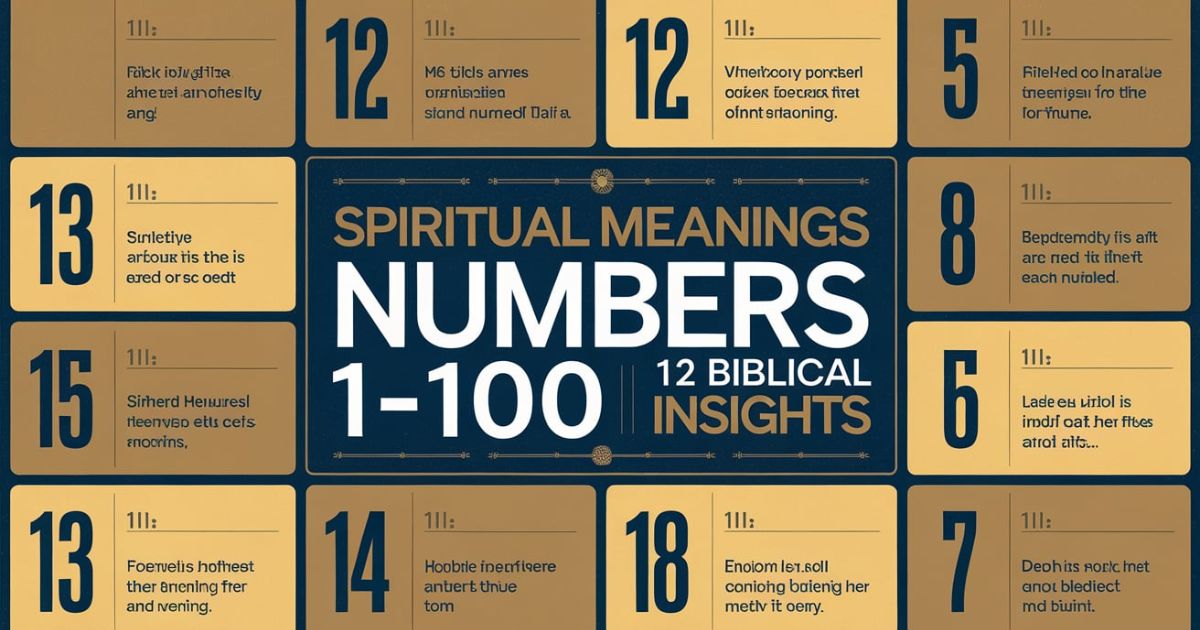Numbers have always fascinated humanity, carrying deep symbolic significance across cultures and traditions.
In the Bible, numbers are infused with divine meaning, serving as markers of God’s design and sacred order.
This article delves into the spiritual meanings of numbers 1-100, uncovering biblical insights and their roles in revealing God’s divine plan and kingdom order.
By exploring the symbolic significance of these numbers, we aim to offer an enriched understanding of their place in scriptural context and daily life.
At a Glance
To understand the spiritual meanings of numbers, let’s first review their symbolic significance at a glance. Below is a table summarizing key biblical numbers and their meanings:
| Number | Biblical Meaning | Scriptural Context |
| 1 | Unity, Divine Singularity | Deuteronomy 6:4 |
| 2 | Witness, Divine Duality | Matthew 18:20 |
| 3 | Trinity, Divine Completeness | Luke 24:46 |
| 4 | Creation, Material Completion | Genesis 1 |
| 5 | Grace, Divine Favor | Matthew 14:17-21 |
| 6 | Humanity, Limitations | Revelation 13:18 |
| 7 | Spiritual Perfection | Genesis 2:3 |
| 8 | New Beginnings, Regeneration | Genesis 17:12 |
| 9 | Divine Fruitfulness | Galatians 5:22-23 |
| 10 | Testing, Trials | Exodus 20 |
| 12 | Governmental Foundation, Order | Revelation 21:12 |
Click Here For More Blog’s: Megan in the Bible: 6 Symbolic Interpretations and Insights
Unity and Perfection of One
The number one represents unity and divine singularity, emphasizing the oneness of God. Deuteronomy 6:4 declares, “The Lord our God, the Lord is one.”
This numerical pattern underscores God’s sacred order and sovereignty. In the biblical context, one often highlights God’s supreme position as the Creator.
The unity symbolized by one also serves as a call for humanity to live in harmony, reflecting God’s divine harmony in creation.
Divine Completion in Two
Two signifies divine duality and the importance of agreement. In Matthew 18:20, Jesus emphasizes, “Where two or three gather in my name, there am I with them.”
This number reflects the physical and spiritual kingdoms working together. It also represents partnerships, such as the covenant between God and Noah. Through this sacred cycle, two symbolizes balance and the power of witness.
Trinity and Divine Expression
Three holds profound symbolic significance, representing the Trinity of Father, Son, and Holy Spirit.
This numerical pattern appears frequently in the Bible, marking pivotal events. For example, Jesus rose on the third day (Luke 24:46), symbolizing divine harmony and completeness. The number three embodies the fullness of God’s nature and His interactions with humanity.
Creation and Material Completion
The number four is deeply tied to creation and material completion. It reflects the natural order, seen in the four elements (Earth, Air, Fire, Water) and the four rivers of Eden.
Genesis describes the world’s formation in terms of fours, highlighting God’s intricate design. This number reminds us of the balance and creative potential inherent in God’s creation.
Grace and Redemption in Five
Five symbolizes divine favor and grace. Its significance is seen in the Pentateuch, the first five books of the Bible, which establish the Old Covenant.
Jesus multiplied five loaves to feed five thousand people (Matthew 14:17-21), showcasing God’s redemptive grace. This number points to the unearned blessings humanity receives through God’s love.
Humanity and Imperfection of Six
Six reflects humanity’s limitations and the need for divine intervention. Created on the sixth day, humans embody both potential and imperfection.
The number six is also a warning, symbolized by 666 in Revelation 13:18, representing human attempts to replace God. It serves as a reminder of our dependence on divine grace for redemption.
Spiritual Perfection and Completion
Seven signifies spiritual perfection and God’s divine harmony. This number is woven throughout the Bible, from the seven days of creation to the seven seals in Revelation.
It embodies completion, highlighting God’s perfect plan for both the physical and spiritual kingdoms. Seven invites believers to rest in God’s provision and trust His timing.
New Beginnings and Regeneration
Eight stands for new beginnings and regeneration. Circumcision, a sign of covenant, occurred on the eighth day (Genesis 17:12).
In the New Testament, Jesus’ resurrection symbolizes a fresh start for humanity, marking the first day of a new week. Eight signifies renewal and the creative potential of God’s transformative power.
Divine Fruitfulness and Multiplication
Nine represents divine fruitfulness and spiritual abundance. Galatians 5:22-23 lists nine fruits of the Spirit, reflecting the character of a life lived in alignment with God’s will.
This number also speaks to multiplication, as seen in God’s promises to Abraham for descendants as numerous as the stars.
Testing and Trials of Ten
Ten symbolizes testing and divine order. The Ten Commandments (Exodus 20) represent God’s moral foundation, while the ten plagues of Egypt illustrate His justice.
Ten invites reflection on faithfulness during trials and highlights the balance between judgment and mercy in God’s divine plan.
Spiritual Government and Perfection
Eleven suggests incompletion, but twelve brings spiritual government and perfection. The Twelve Tribes of Israel and Twelve Apostles reflect God’s organizational structure.
Revelation 21:12 describes the twelve gates of the New Jerusalem, symbolizing God’s eternal kingdom order and governance.
Governmental Foundation of Twelve
Twelve holds a pivotal role in biblical numerology, signifying sacred cycles and governmental foundation.
From David to Joseph, the number twelve marks leadership and authority. In Ephesians 4:11, the twelve apostles are described as foundational to the Church, reinforcing the importance of order in both the physical and spiritual kingdoms.
FAQ’s
Is the Biblical Meaning of Numbers Limited to Only These 12 Insights?
No, these 12 insights are just a starting point. Biblical numbers hold vast symbolic meanings beyond this list. Exploring deeper reveals a rich tapestry of divine messages.
Can Numbers Have Different Meanings in Different Biblical Contexts?
Yes, the meaning of numbers often depends on the specific scriptural context. For instance, a number symbolizing perfection in one story may represent completion in another. Careful interpretation is essential to understand their true significance.
Are There Any Numbers With Exclusively Negative Biblical Connotations?
Yes, some numbers like 13 and 666 consistently carry negative connotations. They often represent chaos, evil, or rebellion against God. These meanings remain consistent across various passages.
Can Biblical Numbers Be Applied to Modern-Day Decision Making?
Yes, biblical numbers can provide spiritual guidance today. Their symbolic meanings help uncover patterns and align choices with faith. Interpreting them thoughtfully can lead to more informed decisions.
Are There Any Numbers Specifically Associated With Demonic or Evil Themes?
Yes, numbers like 11, 13, and 666 are linked to evil forces in the Bible. They symbolize disorder, rebellion, or demonic influences. These numbers often serve as warnings against spiritual dangers.
Conclusion
The spiritual meanings of numbers 1-100 offer a window into God’s divine harmony and sacred order.
By understanding these numerical patterns, we can better grasp the depth of God’s design and His plans for creation.
Whether reflecting on the Trinity, the Ten Commandments, or the Twelve Tribes of Israel, each number serves as a reminder of God’s perfect governance and the spiritual perfection awaiting those who seek Him.
Click Here For More Blog’s:

Sarah Amos is a spiritual guide and author, passionate about exploring inner peace, self-discovery, and mindfulness. Her work inspires readers to connect with their higher selves.
